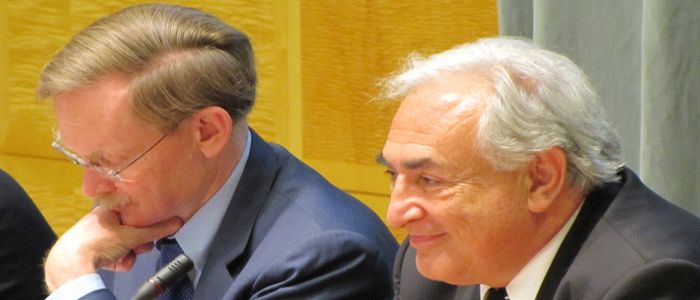“Income-led growth is the key to securing recovery and ending the kinds of social deprivation and misery we’re seeing in countries like Tunisia,” said ITUC General Secretary Sharan Burrow. “We have to stop the financial elites regaining control and sowing the seeds of an imminent new crisis at a time when workers are still suffering the unemployment caused by the last one.”
In response, IMF Managing Director Strauss-Kahn agreed that tackling the jobs crisis, in particular the tragedy of long-term unemployment with all its social consequences, was essential and said jobs would be a central priority for IMF actions in 2011. He expressed determination to mitigate the social impact in crisis-hit countries such as Romania, Greece, Pakistan, Latvia and Jamaica and reiterated the IMF’s commitment to working with the ILO to establish a universal social protection floor. Strauss-Kahn also condemned the unacceptable resumption of financial speculation by banks and bankers, resulting from the G20’s failure to carry through the financial regulation reforms they had begun in 2009, and called for a financial activities tax to change the culture of banking speculation.
“We differ with the IMF on the form of the tax, as we consider a financial transactions tax would better deliver the resources for development, climate action and quality public services the world desperately needs, but we strongly agree that action to regulate the financial sector and stop the speculators’ attacks on democratically elected governments must be taken at once,” stated Burrow.
World Bank President Robert Zoellick committed the Bank to consult trade unions effectively at national level, in countries such as Pakistan, Nepal and the Dominican Republic as well as sectorally and by improving their protocols of cooperation at global level. He laid great stress on the need to address the food price crisis, through Bank actions to enable nutrition for the most vulnerable and investments in seeds and fertilizers as well as by improving social safety nets. Zoellick further committed the Bank to support all the ILO core labour standards and to incorporate workers’ protections, such as maternity protection, into ongoing World Bank work on the labour market.
Burrow responded, “We welcome Mr. Zoellick’s commitments to workers’ rights and tackling growth inequalities, and call on him to ensure full World Bank support for the ILO’s campaign for a universal social protection floor.”
The trade union delegation went on to meet the Executive Directors of the IMF and World Bank, the government representatives whose regular Washington meetings decide the loans of the two institutions, and impressed upon them the urgency of stepping up the institutions’ policies to tackle the global jobs crisis.
The meeting also discussed the structural policy recommendations for labour market reforms being promoted by the IFIs as well as the OECD. “Recommendations that call for weakening employment protection and wage setting machinery are totally flawed,” said John Evans, general secretary of TUAC-OECD. “Countries that have had better employment performance during the crisis are those that have strong systems of social dialogue and labour market institutions. These need to be strengthened not weakened.”
Other sessions of the three-day series of meetings dealt with social protection, IMF actions on financial regulation, the World Bank’s requirements for protection of labour standards in loan programmes and the Bank’s “Doing Business” publication.
To read the Statement of trade union priorities for the French Presidency of the G8 and G20 in 2011


